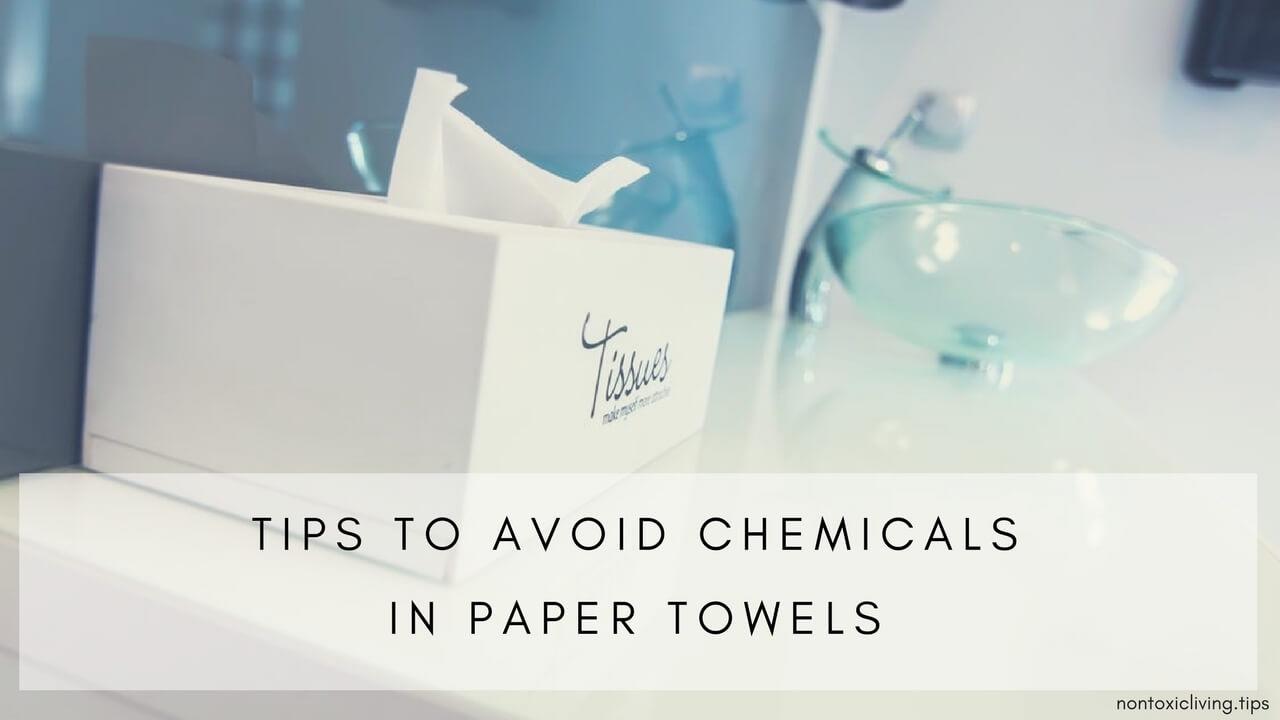
Chemicals in Paper Towels: Are There Nontoxic Alternatives?
Jan 10, 2018by Angela Cummings and Sophia Ruan Gushée
Paper towels are handy for cleaning up a milk spill, drying hands, and cleaning the house. Maybe a little too handy.
In 2017, consumers spent $39,203 million on household paper products (paper towels, toilet paper, napkins, tissues, etc). Plus, consumer spending went up by $1,958 million over a two-year period, with spending totaling a lesser $37,245 million in 2015. (1)
Let’s look at it another way.
Americans use 741 pounds of paper each year, on average. Nearly 55 of those pounds are for household paper products such as paper towels, napkins, tissues and toilet paper. (2)
Per year!
That’s a lot of paper products.
As users of so many paper products it’s worth asking, are chemicals found in these products and if so, are there nontoxic alternatives?
Are Chemicals Found in Paper Towels?
Paper products, such as paper towels can contain dyes, inks, fragrances, chlorine bleach, formaldehyde, adhesives, and other chemicals. Here are a few of the specifics:
- CDFs. Chlorodibenzofurans (CDFs) is a chemical group with over 135 types of chemicals. They may affect the nervous system, respiratory system, and irritate the skin and eyes. CDF has been found in paper towels, coffee filters, milk cartons, and tampons. (3)
- Triclosan. Triclosan is added to products as an antimicrobial with the intention of reducing, or preventing, bacterial contamination. (4) The chemical can be found in soaps, toothpastes, cosmetics, clothing, toys, furniture, and paper products, such as paper towels or napkins. It can also be found in the bodies of most Americans. Triclosan may be affecting the hormone and reproductive systems, and causing an increased sensitivity to allergens. (5)
- Formaldehyde. Paper towels have been found to contain formaldehyde. Formaldehyde is a chemical in the Volatile Organic Compound (VOC) family, and off-gasses into the air. People can be exposed to formaldehyde through touching products as well. (6) Of course, with paper towel touching (especially when wiping our hands) exposure is pretty common.
- BPS. Created as an alternative to the toxic chemical BPA (bisphenol A), BPS (bisphenol S) has been found to likely have the same effect on people’s health. (7) Found in urine samples from US subjects, BPS may affect the hormone systems. Products such as newspaper, food paper, and paper towels have been found to have BPS in them. The BPS may have been from the recycling process. (8)
Are There Nontoxic Paper Towels?
There are companies that make paper towels with nontoxic ingredients, such as using peroxide instead of chlorine bleach for whitening. Some companies simply leave ingredients, such as dyes and inks out of products. It’s tough to know for sure though.
Manufacturing companies are not required to list ingredients on paper towels, keeping consumers in the dark about the full list of ingredients used to make the product. The next best thing consumers can do is to choose paper towels that say it does not have dyes, fragrances, or bleach in it.
Another option is to ditch the paper towels (nearly) all together, and use fabric towels instead. Limit use of paper towels to cleaning soiled areas, such as toilets. Instead of using paper towels for dusting and wiping surfaces, use rags (old or new!) for cleaning the house.
Hang hand towels in the kitchen and bathrooms for drying hands after washing. Have one or two extra hand towels hand-y (ha!) when entertaining guests so that towels can be changed if they become too wet. When buying new hand towels, choose towels made from organic, natural fabric and dyes plus those without finishes.
Breaking the habit of using so many paper towels (and other paper products) may take a little getting used to but can be a worthwhile change. There’s a potential to reduce the amount of money that the household is spending on paper products, reduce the amount of chemicals in the home, and reduce the poundage of paper products used per year. An all around win!
Enjoy Support for Practical Nontoxic Living!
Curious which specific brands of products our nontoxic living expert, Sophia Ruan Gushée, uses? Register for a free intro to the D-Tox Academy to detox your home and life at a pace that’s comfortable for you. Included a the shopping list of Sophia's household staples.
References
(1) U.S. Dept of Commerce, Bureau of Economic Analysis. https://www.bea.gov/iTable/iTable.cfm?ReqID=19&step=2#reqid=19&step=3&isuri=1&1921=underlying&1903=2017
(2) Environmental Working Group - Enviroblog. https://www.ewg.org/enviroblog/2014/04/lets-talk-trash#.Wj2Q7N-nHIU
(3) ATSDR - CDFs. https://www.atsdr.cdc.gov/toxfaqs/tf.asp?id=937&tid=194
(4) U.S. Food and Drug Administration. https://www.fda.gov/forconsumers/consumerupdates/ucm205999.htm
(5) Environmental Working Group. https://www.ewg.org/research/ewgs-guide-triclosan#.Wj2nfd-nHIV
(6) ATSDR - Formaldehyde. https://www.atsdr.cdc.gov/toxprofiles/tp111-c1.pdf
(7) Environmental Health Perspectives. https://ehp.niehs.nih.gov/1408989/
(8) Pollution Prevention Resource Center. http://pprc.org/index.php/2012/p2-rapid/bps-as-a-replacement-for-bpa-in-thermal-paper/
Stay connected with nontoxic lifestyle news and updates!
Receive our free Ruan Living Nontoxic Cleaning Guide when you join our email list.
Don't worry, your information will not be shared.
We hate SPAM. We will never sell your information, for any reason.







